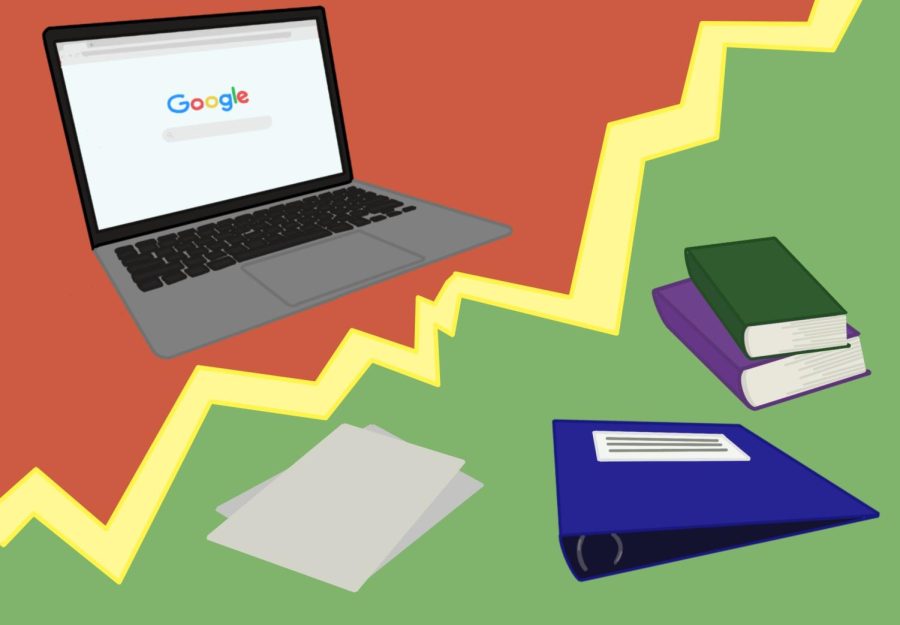The heavy influence of Schoology has caused controversy over whether paper or online materials are a better fit for students.
Head to Head: Do paper materials or technology benefit students more?
August 26, 2022
As Midtown moves away from paper materials and embraces the use of technology, A&E Managing Editor Maddie Shaw and Writer Liam Geissler-Norseng take sides over which learning tool is better.
Paper assignments encourage interactivity in classrooms
As a result of Schoology’s integration into the learning curriculum, computer use has increased for assignments and assessments. With the growth in computer utilization, paper resources for day-to-day classwork have diminished, leaving students with insufficient interaction with peers and little classroom involvement.
As students silently complete work on the computer, they are isolated from the classroom around them, and prevented from interacting with the students. Group work is a scarce activity as each student may have to turn in their own version of the group work. There is no communication, and it is as if students have returned to the familiar ways of online school.
With our return to in-person learning, interaction should be encouraged to promote the cultivation of new ideas and the formation of friendships while also straying from the desolate classroom of virtual learning. Instead, the incorporation of computers has furthered students from the collaborative classroom they seek.
When testing, many students perform better when they can work on paper. From annotating a passage to showing work for math problems, with the information physically in front of them, students can easily transfer their thought process to questions on assessments. A study by the British Journal of Educational Technology shows that students who participate in lessons on paper performed 24 percent better than students who participated in those same lessons digitally. When testing online, students can make mistakes they usually wouldn’t make on paper. They may get the work for one problem confused with another, meaning online assignments can complicate the day-to-day workload of students.
Additionally, online materials make students more inclined to cheat. According to a study on Academic Integrity in the Age of Online Learning, 93 percent of instructors believe students are more likely to cheat in online school. Even though students have returned to in-person learning, computer-based classwork still applies to many of the concepts of virtual school. With unlimited access to the internet, students may be tempted to utilize the enormous resources a computer presents. While there are protections in place, such as Securely, which is placed on school-issued laptops and allows teachers to monitor students’ computer activity, those platforms aren’t consistently used by all teachers, and students can avoid them by bringing their personal computers to school. As a result, cheating can still occur.
With the use and access to computers, students can fall into a pattern of sustained cheating to maintain high grades. If other students are participating in cheating, they may feel their actions are condoned. Research from the American Psychological Association shows that seeing peers engage in cheating increases one’s own inclination to cheat. Therefore, an online resource, such as a computer, can reinforce cheating.
To prevent computer overuse, there should be a healthy balance between online and paper assignments since it is improbable computer use will be completely restricted. This way, an environment is created where students have an array of schoolwork to complete, while also allowing for an engaging classroom. When students complete the same mundane assignments, they often become uninterested in their lessons and find it difficult to summon motivation. If diverse forms of schoolwork are given, students can be encouraged to challenge themselves while remaining focused.

Maddie Shaw is a senior and the Managing Editor of the A&E section of the Southerner. This is her fourth year working on the paper. When she’s not...
Digital learning more effective than paper materials
Over the past few years, Midtown has moved away from paper learning and more towards an online-based curriculum. This transition to digital learning is a significant improvement over paper methods.
Paper learning relies on students being present in class to listen to lectures, take notes, do assignments and view presentations. If a student is out of class, they have no way of keeping up with the material or completing work. On the other hand, digital education is run through applications like Schoology, where students join their teacher’s online class to gain access to materials, making it easy for students who are absent to catch up on missed work.
This centralized location where all classroom resources can be found has numerous benefits for both students and teachers. One such benefit is that students can log into their computers at the beginning of the day and be instantly presented with everything they need to learn. There is no waiting for a handout to be passed out, for other students to be ready, or for a presentation slide to be flipped. Students can dive into their work without the unnecessary delays and hassles that paper learning causes. Teachers don’t have to worry about whether all students have papers or if students missed any directions. In a digital classroom, teachers can spend more time answering questions, providing individual help and having productive discussions.
Most importantly, switching from paper to digital learning opens the door to a near limitless supply of free educational resources. Students gain access to lectures by world-renowned educators, supplemental programs like Khan Academy, informational websites like Encyclopedia Britannica and study tools such as Quizlet or Duolingo. All these extra resources allow students to take control of their learning in a way that isn’t possible using paper.
However, the helpfulness of these resources is not limited to just students. Teachers gain access to new teaching methods and lesson plans from around the world. With these assets, teachers can better engage students with new types of lessons and different ways of learning information. Furthermore, teachers can quickly gauge their class’s understanding of a topic with a short quiz or progress check online. On paper, it can take hours or days for a teacher to grade and review all their students’ assessments. An online quiz is graded instantly, saving teachers countless hours and granting immediate feedback that will help them assess where their students are, what they need help on and how they need to adjust.
Although the use of computers can introduce added distractions like online games and internet browsing, these problems are effectively mitigated by placing restrictions on internet usage. Atlanta Public Schools blocks access to gaming websites, social media and YouTube. Additionally, teachers are provided with the tool Securely, an internet filter that monitors and restricts the tabs students access. By continuing to maintain and adapt these restrictions, APS can eliminate the distractions that come with learning online.The goal of high school is to prepare students for the real world, and the real world is becoming increasingly digitized. Those graduating with the ability to effectively navigate in an online environment have a distinct advantage over those who have spent their entire four years reading out of a textbook. Thus if students are to be well-prepared for life post-high school, then digital learning is a must.

Liam is a Junior in his third year writing for the Southerner. Outside the paper, he plays for the Midtown tennis team and is a member of the G3 Robotics...
